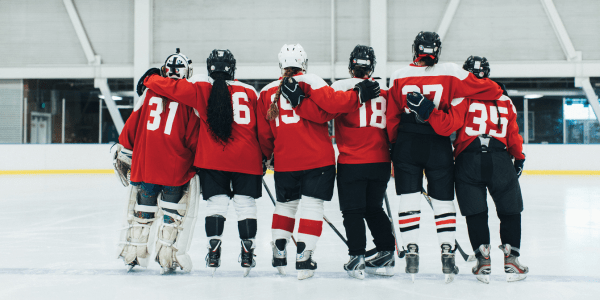Mental Lapse Versus Flow in a Game
“Play until the whistle blows”… Surely, you have heard this expression at some point in your hockey career.
Coaches use this phrase to motivate players to keep fighting until the very last second of the game, no matter the score. You would never want to give up on yourself or the game because it can become a counterproductive to a strong mental game.
“Play Until the Whistle” has Another Meaning…
Don’t give up on a play during the game until the play is called dead. This may sound obvious but there are many times when a hockey player gives up on a play and it comes back to haunt them.
For example, let’s say you make a soft cross pass along the blue line to set up a teammate for a shot. But the pass is intercepted and you drop your head in frustration before you get back in the play. That slight pause could set up the opposing team for a 2-on-1 breakaway.
Another example is when you expect the referee to whistle the play dead but there is no call. While expecting a whistle for offsides, icing or a penalty, your brief hesitation could lead to a great scoring chance for the other team.
Often athletes hesitate when they are frustrated after a mistake or angered over a non-call. This brief pause in play or mental lapse gives the opposing team a big advantage.
Just such a mental lapse cost the Boston Bruins in Game 5 of the Stanley Cup in their match-up against the St. Louis Blues. In the third period, Bruin forward Noel Acciari was blatantly tripped by St. Louis center Tyler Bozak.
While Boston waited for a penalty to be called, some of the players let up waiting for the whistle to blow.
Not only was there no whistle, the Blues took advantage of the lax Bruin team and scored a few seconds later which turned out to be the game-winning goal. The Blues went on to win 2-1 and take a 3-2 lead in the series.
After the game, Acciari talked about the missed call but the mental lapse played a big part in the loss of the game.
ACCIARI: “It’s a missed call, and it has a big (part) in the outcome of the game. They score a goal off it. That ends up being the game-winner. It’s just kind of embarrassing.”
Players make mistakes in hockey games all the time. And officials are not perfect–they make mistakes too.
When you allow your emotions take over and cause a mental lapse, you compound the problem which may very well cost you the game.
How to Prevent Mental Lapses During Games:
Immerse yourself in the flow of the game. Don’t wait for an official to step in when a possible penalty has occurred, since it might not happen! Keep playing hard. Fully focus until the end of the play.
If you get distracted by a missed call, a cheap shot, or a mistake you made, quickly refocus on the current play. Avoiding dwelling on the past, which is the problem for athletes.
Related Articles on Hockey Mental Game:
- How to Create a Winning Mindset for Hockey
- How Hockey Players Grow into Their Potential
- 5 Components of Managing Injuries
*Subscribe to The Sports Psychology Podcast on iTunes
*Subscribe to The Sports Psychology Podcast on Spotify
Mental Coaching Programs for Hockey
Our mental game coaching programs for hockey players helps athletes improve confidence, concentration, let go of errors quickly, and stay composed during crunch-time. Read more about sports psychology for hockey players at Peaksports.com
Please contact me by phone at 888-742-7225 or by filling out the webform below to learn more about our personal mental training programs for hockey players or teams:

Leave a Reply